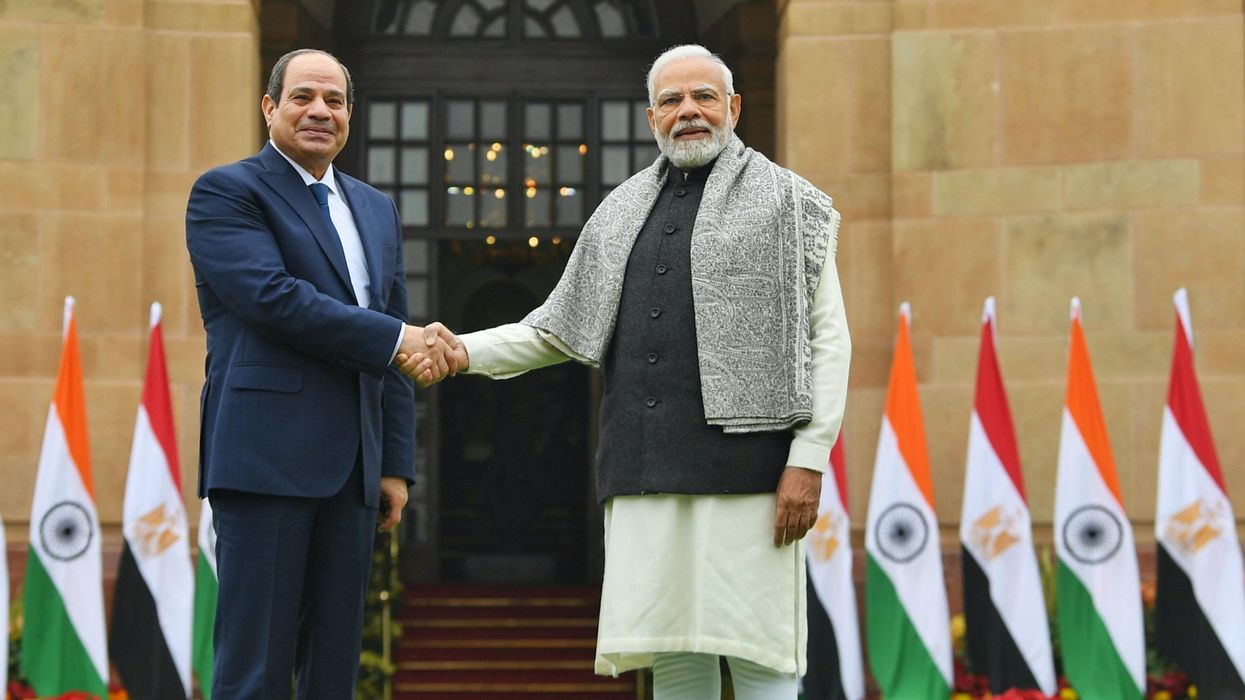
As Indian Prime Minister Narendra Modi welcomed Egyptian President Abdel Fattah El-Sisi as the chief guest at his nation’s 74th Republic Day celebrations, Amnesty International on Thursday led calls for both right-wing leaders to “address the ongoing human rights and impunity crises” in their respective countries.
Meeting ahead of events commemorating the adoption of India’s constitution—including a military parade in which members of the Egyptian army marched—Modi and El-Sisi agreed to elevate bilateral ties to a “strategic partnership,” while calling for a “coordinated and concerted” effort to combat “terrorism.”
Modi—who said Wednesday that he and El-Sisi “are in agreement that terrorism is the biggest threat to humanity”—has, like his Egyptian counterpart, been accused of using anti-terrorism laws to crush critics and silence dissent.
“The current human rights crises in India and Egypt are characterized by entrenched impunity and misuse of counterterrorism legislation to clamp down on civic space and peaceful dissent.”
“The current human rights crises in India and Egypt are characterized by entrenched impunity and misuse of counterterrorism legislation to clamp down on civic space and peaceful dissent,” Philip Luther, Middle East and North Africa research and advocacy director at Amnesty International, said in a statement.
“Both countries show striking parallels in their attempts to harass and intimidate into silence all actual or perceived government critics and opponents. This unrelenting assault on human rights must end,” he added.
\u201cThe Indian and Egyptian authorities must address the ongoing human rights and impunity crises in the two countries. Both show striking parallels in their unrelenting assault on rights. https://t.co/gbmoAkMnXT\u201d— Amnesty India (@Amnesty India) 1674710907
As Amnesty noted:
In recent years, authorities in both countries have severely repressed the rights to freedom of expression, association, and peaceful assembly and failed to address entrenched discrimination against religious minorities.
[…]
Human rights defenders, lawyers, political opponents, peaceful protesters, academics, and students, face arbitrary arrests and detention, unjust prosecutions, and other forms of harassment and intimidation solely for their peaceful exercise of their human rights in both India and Egypt.
“India and Egypt seem to have taken their long-standing bilateral cooperation to a different level where they share tactics to increasingly repress rights and freedoms,” Amnesty International India board chief Aakar Patel said in a statement. “As the leaders of the two countries take the center stage, celebrations of the adoption of India’s constitution 74 years ago should not overshadow the grim reality that the human rights situations in both countries have been on a downward spiral.”
\u201c\u201cThe current human rights crises in #India & #Egypt are characterized by entrenched impunity and misuse of counterterrorism legislation to clamp down on civic space & peaceful dissent\u201d, @amnesty said today, as India hosts President Sisi as the chief guest at its Republic Day.\u201d— Nuria Tes\u00f3n (@Nuria Tes\u00f3n) 1674743767
Leading an open letter from Egyptian and Indian diaspora members published Tuesday by the Canadian alternative news site rabble.ca, Ehab Lotayef, Samaa Elibyari, and Jooneed Jeeroburkhan noted that India’s constitution “guarantees full equality and rights to all Indians and declares the country a secular, socialist republic.”
“However today’s India is led by a Hindu ethno-nationalist party committed to converting it into a Hindu nation,” the authors continued, and “the government of India has been called out by domestic and international human rights organizations for unleashing and engendering violence and detentions against Muslim, Dalit, and Christian minorities as well as any human rights defenders.”
“Meanwhile, January 25 marks the start of the 17 days in 2011 which forced one of the region’s longest-serving and most influential leaders, Egyptian President Hosni Mubarak, from power,” they continued. “We recall that moment of incredible exhilaration as all Egyptians aspired to more democracy and social justice. Unfortunately, on July 3, 2013, then-Gen. Abdel Fattah El-Sisi staged a coup d’état that toppled President Mohamed Morsi, the first democratically elected president of Egypt, and returned the country to dictatorial rule.”
\u201c”What is happening in Egypt and India should be of interest to all Canadians, even if they are not of Egyptian or Indian origin. Support for governments that violate fundamental rights diminishes democracy everywhere.” https://t.co/sXAmcQlOba\u201d— Canadians for Justice and Peace in the Middle East (@Canadians for Justice and Peace in the Middle East) 1674656645
“Since his ascent to power through dubious elections, El-Sisi has governed Egypt with an iron fist,” the trio wrote. “Under his direct command, on August 14, 2013, two encampments of protesters in Rabaa and al-Nahda squares, demanding that President Morsi be reinstated, were dismantled by lethal force and more than 1,000 people were killed.”
“To date, no one has been held accountable,” the authors added. “Since then, all dissenting voices have been silenced and more than 60,000 political prisoners languish behind bars in abject conditions.”
This post was originally published on Common Dreams.
